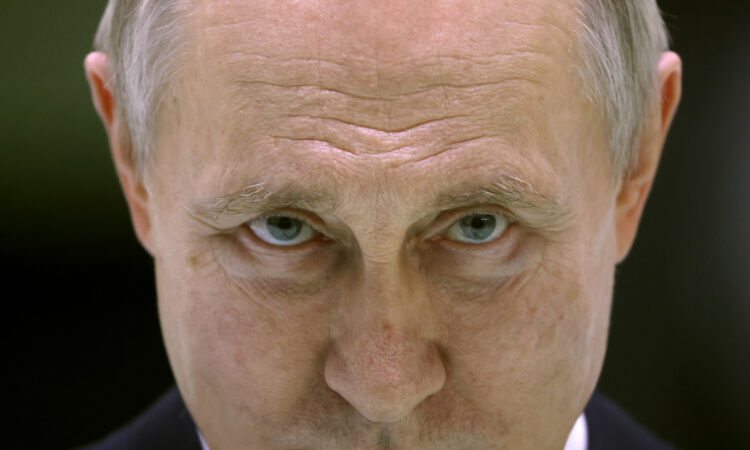
Billions in Russian oil sale profits are stuck in Indian banks, marking a blow to President Vladimir Putin’s attempts to stop using the U.S. dollar for trade.
Commodities such as oil, gold and wheat are typically traded around the globe in U.S. dollars, the world’s reserve currency.
However Russia’s financial system was essentially isolated by Western sanctions imposed after Putin‘s invasion of Ukraine, making his country unable to make transactions in greenbacks, thus limiting trade.
Putin has tried to get around this by selling oil to countries such as China and India in their local currencies, the yuan and rupee respectively, raising fears this would undermine the strength of the U.S. dollar abroad.
China has also sought to weaken the U.S. dollar’s hold on world trade by calling on Gulf Arab leaders to allow oil and gas to be purchased in yuan. Some reports even allege that a bilateral deal denominated in yuan may be in the works.
However, recent attempts to de-dollarize bilateral trade with India appear to have backfired on Moscow.
Russia has become one of India’s top oil suppliers and has earned billions of dollars in sales. This has resulted in an accumulation of up to $1 billion each month in rupee assets in Indian banks that cannot be accessed due to restrictions by the Reserve Bank of India, which prevent Russian companies from transferring rupees stored in bank accounts in India to Russia and converting them into rubles, Bloomberg reported.
Timothy Ash, an economist and associate fellow in the Russia and Eurasia program at British think tank Chatham House, said the war in Ukraine and the sanctions subsequently levied on Russia has “just reaffirmed the dollar is king.”
“There is simply no quick fix for Russia, China et al, when globally it’s still a case of ‘in the US dollar we trust’,” Ash told Newsweek. “[I] guess Russia [is] just finding out why everyone trusts the dollar—it is freely convertible, while the rupee is not.”
“India operates a partially convertible capital account, which entails that the [Indian rupee] can be swapped for foreign currencies and vice-versa for limited reasons,” according to Aditya Bhan, of the Observer Research Foundation, a global think tank.
Concerns about the stability of the exchange rate are the primary obstacle behind the Indian government’s reluctance to make the rupee fully convertible.
“Stable prices constitute the most critical precondition for internationalizing a currency,” Bhan wrote. “A further worry is that internationalizing the [Indian rupee] could curb the Reserve Bank of India’s (RBI’s) ability to manage domestic money supply and affect interest rates according to prevailing macroeconomic circumstances.”

Contributor/Getty Images
As a result of these restrictions, as much as $39 billion could be stuck in Indian bank accounts, according to Reuters.
“This is a problem,” Russia’s Foreign Minister Sergei Lavrov told reporters in the Indian state of Goa in May. “We need to use this money. But for this, these rupees must be transferred in another currency, and this is being discussed now.”
In September, Lavrov appeared to admit that Moscow has all but given up on rescuing its rupee-denominated stash worth billions from India.
“We talked with [Indian Foreign Minister] Subrahmanyam Jaishankar in Jakarta and discussed bilateral issues, including such problems [as the mechanism of payments between Russia and India]. In the current situation, many billions of rupees have accumulated, which have not yet found their application, and our Indian friends have assured that they will offer promising areas where they can be invested,” Lavrov said on September 10, according to TASS.
Newsweek has contacted Russia’s Foreign Ministry via email for additional comment.
Indeed, Russia’s only option to use the money at the moment appears to be spending or investing it in India. But there is a lopsided trade relationship between New Delhi and Moscow, with India selling precious little to Russia, leaving them unable to spend.
Aside from oil, Russia is one of India’s top suppliers of weapons and military hardware. Between April 2022 and February 2023, India’s imports from Russia reached $41.56 billion, including a more than 900% increase of crude oil imports year-on-year, according to Factly data. Meanwhile its exports to Russia amounted to just $3 billion.
This means “the volume of ‘frozen funds’ can reach tens of billions of dollars,” Alexander Knobel, director of the Institute of International Economics and Finance of the Ministry of Economic Development, told Bloomberg. “The situation is aggravated by India’s historically high aggregate trade deficit, which reduces the possibilities of clearing settlements with third countries.”
Last month, Mikhail Zadornov, former Russian finance minister and former head of one of the country’s largest banks, suggested in a column for Russian news outlet RBC that the failure to return these earnings from exports to India is “the direct cause of the depreciation of the [ruble] exchange rate this summer.”
“Another non-obvious reason for the weakening [of the ruble] is the stuck rupees. Russia supplied $30 billion worth of oil and petroleum products to India in the first half of the year, and our imports from India are estimated at approximately $6-7 billion per year,” he wrote. “We have nothing to buy in India, but we cannot return these rupees because the rupee is an inconvertible currency.”
Russia has also expressed interest in building an alternative payment mechanism with other BRICS (Brazil, Russia, India, China and South Africa) nations. But in July, India’s foreign minister Jaishankar said “there is no idea of a BRICS currency.”
Do you have a tip on a world news story that Newsweek should be covering? Do you have a question about the Russia-Ukraine war? Let us know via [email protected].
Update: 09/11/2023 6:40 a.m. ET: This story was updated with quotes from Timothy Ash.
Uncommon Knowledge
Newsweek is committed to challenging conventional wisdom and finding connections in the search for common ground.
Newsweek is committed to challenging conventional wisdom and finding connections in the search for common ground.



